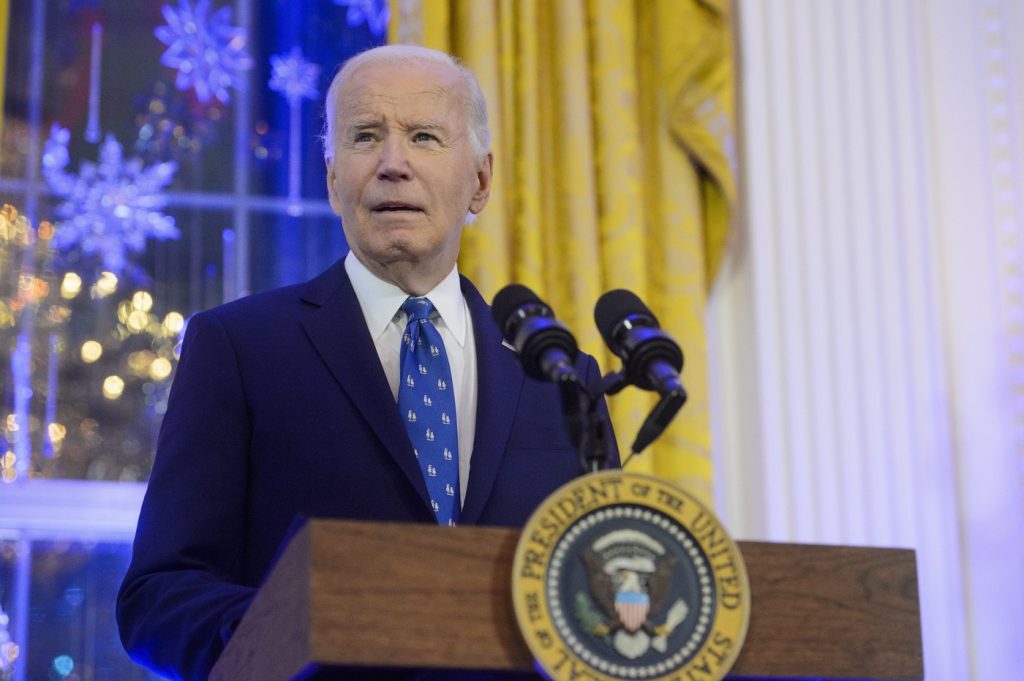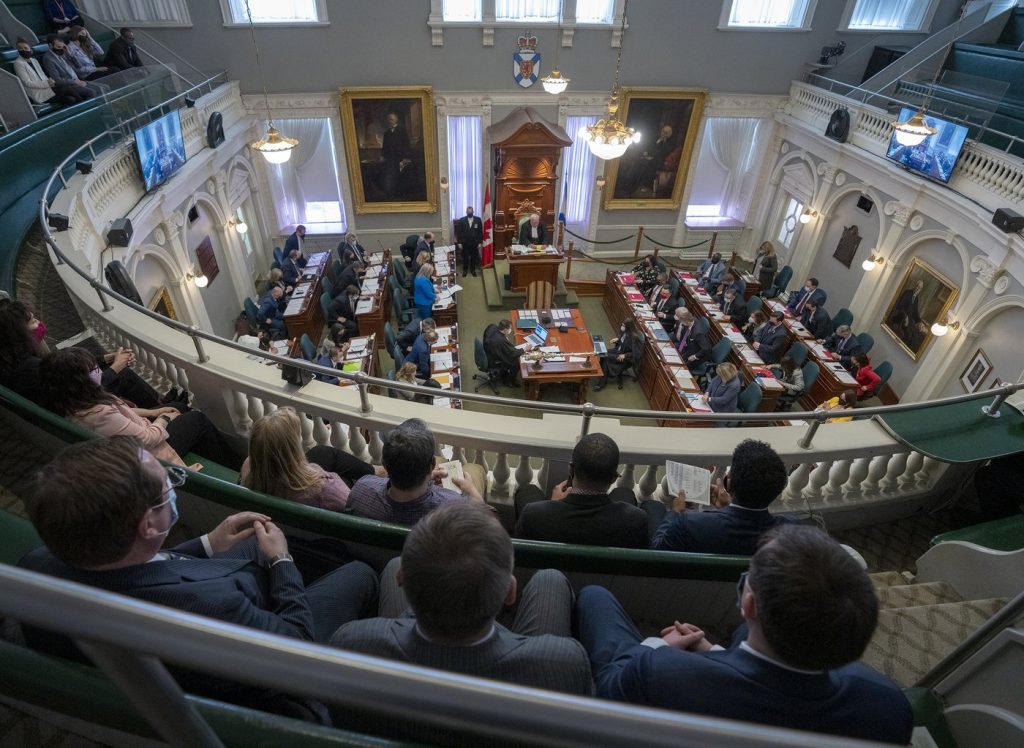Biden, on his way out, sets ‘ambitious’ climate goal: Cut US greenhouse gas emissions by over 60%

Posted Dec 19, 2024 10:49:56 AM.
Last Updated Dec 19, 2024 07:31:14 PM.
WASHINGTON (AP) — President Joe Biden is pledging to cut U.S. greenhouse gas emissions by more than 60% by 2035 as he fights to ensure his legacy on slowing global warming, even as President-elect Donald Trump vows to undo much of Biden’s climate work when he takes office next month.
Biden said the new goal — which supersedes a previous plan to cut carbon emissions at least in half by 2030 — keeps the United States on track to achieve net-zero greenhouse gas emissions economy-wide by 2050. The U.S. is making a formal submission of the new target, known as a Nationally Determined Contribution, to the United Nations under terms of the 2015 Paris climate agreement, Biden said Thursday.
The new goal calls for reducing net emissions by 61% to 66% below 2005 levels in 2035.
“I’m proud that my administration is carrying out the boldest climate agenda in American history,” Biden said in a videotaped statement.
“We’re doing it by setting ambitious goals” such as deploying 30 gigawatts of offshore wind and conserving at least 30% of U.S. lands and waters by 2030, Biden said. His administration also has set strict new standards to cut air pollution from cars, trucks and power plants and signed into law the most significant investments in climate and clean energy in U.S. history, he said.
The action by the Democratic president comes just over a month before he is set to leave office. Trump has already promised to unleash a series of executive actions that will seek to undo most or all of Biden’s climate agenda as the Republican president-elect pushes for “energy dominance” around the globe.
Trump no longer dismisses climate change as a “hoax” but has pledged to dismantle what he calls Democrats’ “green new scam” in favor of boosting production of fossil fuels such as oil, natural gas and coal, the main causes of climate change. Trump is expected to withdraw the United States from the Paris climate accord, as he did during his first term, and will likely move to repeal parts of the landmark Inflation Reduction Act, especially subsidies that benefit electric vehicles and offshore wind.
Biden aides tried to downplay the impact of Trump’s return to the White House, insisting that states and local governments can continue to lead on clean energy.
“American climate leadership is determined by so much more than whoever sits in the Oval Office,” said John Podesta, Biden’s senior adviser for international climate policy.
Climate leadership “happens on the ground in our cities and states, from Phoenix to Pittsburgh, from Boise to Baltimore,” Podesta told reporters Wednesday. “And I believe that with this new 2035 target as their North Star, leaders across America can show the world that we are still in this fight for a better future.”
Trump spokeswoman Karoline Leavitt said that in his first term, Trump “produced affordable, reliable energy for consumers along with stable, high-paying jobs for small businesses — all while dropping U.S. carbon emissions to their lowest level in 25 years. In his second term, President Trump will once again deliver clean air and water for American families while Making America Wealthy Again.”
While carbon emissions dropped around the world in 2020, that was largely due to the economic shutdown caused by the COVID-19 pandemic. Air travel and other activity came to a near standstill.
The U.S. Climate Alliance, a bipartisan coalition of governors that support climate action, pledged to work toward the new target, with or without help from the White House.
New York Gov. Kathy Hochul, the alliance’s co-chair, said climate-conscious governors “will carry the torch forward” after Biden leaves office. Hochul, a Democrat, said governors will use the new U.S. goal to “keep America on track toward a cleaner, safer future.”
“By continuing to stamp out climate pollution together, we’re safeguarding public health, protecting the environment, growing the economy and creating good jobs across the U.S,” said New Mexico Gov. Michelle Lujan Grisham, another alliance co-chair.
Biden, in his remarks, called the new goal “ambitious” and said it would lead to thousands of well-paying jobs, more affordable energy, cleaner air, cleaner water and a healthier environment for all Americans.
“It is also creating real momentum because we’re unleashing American ingenuity and innovation. And together, we will turn this existential threat into a once-in-a-generation opportunity to transform our nation” for decades to come, Biden said. “I know we can do this.”
The proposal would require sustained changes across the economy, from power generation to transportation, buildings, agriculture and industry, including significant increases in renewable energy such as wind and solar power and steep cuts in emissions from fossil fuels such as oil and coal.
The U.S. pledge includes methane reductions of at least 35% from 2005 levels by 2035, Biden said. Cutting methane emissions is among the fastest ways to reduce near-term warming and is crucial to reducing greenhouse gas emissions.
Debbie Weyl, U.S. acting director of the World Resources Institute, a global research organization, said the new emissions target is “at the lower bound of what the science demands,” but said it was “close to the upper bound of what is realistic if nearly every available policy lever were pulled” in the next decade.
“Assertive action by states and cities will be essential to achieving this goal,” she said, adding that the United States needs to swiftly expand renewable energy and electric vehicles, modernize the electric grid and decarbonize heavy industry.
The nonbinding but symbolically important pledge is a key part of the Paris agreement, which calls for countries to submit so-called Nationally Determined Contributions every five years. A country’s NDC, or climate goal, outlines how it plans to reduce greenhouse gas emissions to help meet the global goal of limiting temperature rise to 1.5 degrees Celsius since pre-industrial times.
The Paris Agreement requires that NDCs are updated every five years with increasingly higher ambition, taking into consideration each country’s capacity. The next deadline is February 2025, although Brazil, the United Kingdom and the United Arab Emirates have already submitted their proposed NDCs.
“As the world’s largest producer of oil, the largest producer and exporter of fossil gas — and the largest historical climate polluter — the United States has an outsized responsibility to press forward in the climate fight no matter the political headwinds,” said Manish Bapna, president and CEO of the Natural Resources Defense Council, a leading environmental group.
He called the new climate goal a clear signal for governors, mayors and CEOs who support climate action to “step up” and defend climate progress.
“While the incoming administration has vowed to turn its back on the world — again — the majority of Americans want climate action, and the clean energy boom is unstoppable,” Bapna said.
___
Associated Press writer Seth Borenstein contributed to this report.
Matthew Daly, The Associated Press








